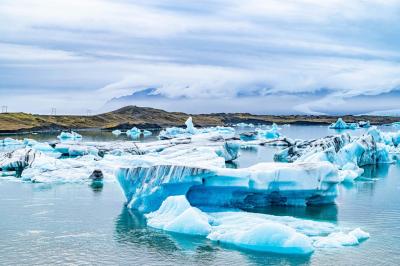Arctic Offshore Oil and Gas Production in a Changing Climate
As Arctic sea ice thickness continues to decline due to climate change, scientists expect that oil and gas resources in the offshore areas of this region will soon be more economically accessible. This study used an integrated human-Earth system model (known as the Global Change Analysis Model, or GCAM) to project Arctic offshore oil and gas extraction across different climate-induced sea-ice conditions. The model also accounted for future global energy market trends and emission reduction scenarios. Assuming a future with a heavy dependency on fossil fuels, the model projected that by 2100 the offshore oil and gas contribution from the Arctic region to global production will be minor, despite lower extraction costs with reduced sea ice. This study also found that efforts to reduce carbon emissions could paradoxically increase Arctic offshore oil extraction by the end of the century. This is due to the relatively low emission intensity expected for future Arctic oil and gas extraction when compared to unconventional oil production (e.g. tar sand extraction) that would become a larger share of oil production under a “business-as-usual” scenario (i.e. remaining at current levels and trends).
This study shows that climate change-induced melting sea ice could make Arctic oil and gas more accessible and economically competitive. This could in turn lead to relatively large increases in Arctic offshore oil production, particularly along the Alaskan Platform in the U.S. but this would be a minor share of global markets. This study explored both the effects of physical climate change impacts on sea ice and global economic drivers for future oil and gas production. This research indicates that while climate change may make Arctic fossil resources more accessible, it is unlikely to significantly alter the global energy landscape by the end of the century. In addition to providing initial insights about the effects of climate change on future Arctic oil and gas production, this study also developed model capabilities for future research to build upon as conditions change and technology evolves.
Using the GCAM, this study explored the future effects of climate change and low-carbon energy transition (i.e., emission reduction) on Arctic offshore oil and gas production. By 2100, assuming a future with a heavy dependency on fossil fuels, Arctic sea-ice loss may lead to an increase in Arctic offshore oil and gas production, with larger effects for offshore oil production than gas. Despite this projected increase, Arctic production would be a small fraction of total global fossil fuel production, with little impact on global energy prices. Surprisingly, in a low-carbon energy transition scenario, Arctic offshore oil production could increase further to replace more emissions-intensive unconventional oil production and meet the overall oil demand.
From a regional perspective, this work finds that the U.S. Alaskan Platform is likely to be one of the largest offshore oil and gas producers in the Arctic. This is due to relatively low sea-ice thickness and large resource potential in the area. However, climate change is not expected to significantly shift offshore oil and gas production in the Arctic before 2030. Overall, this research demonstrates the importance and complexity of sea-ice conditions, technology costs, and market forces as drivers of future Arctic offshore oil and gas development.

